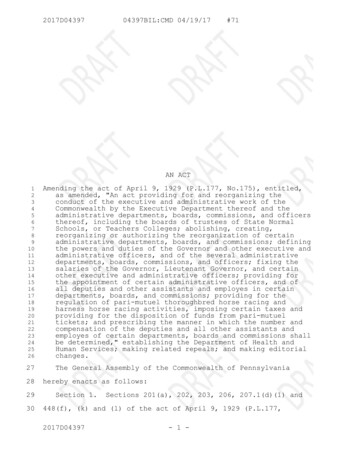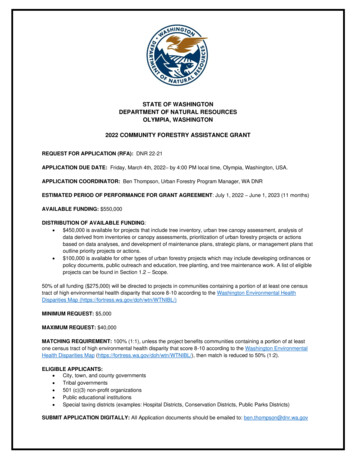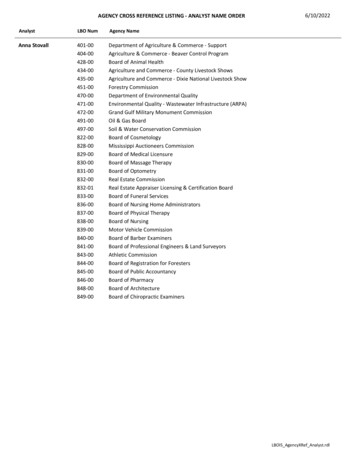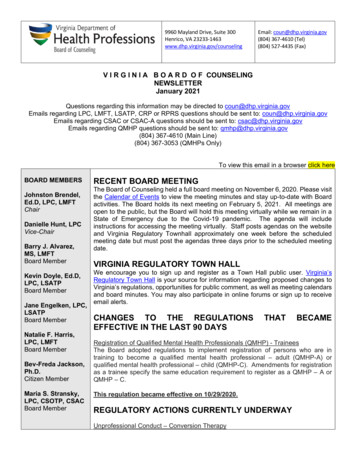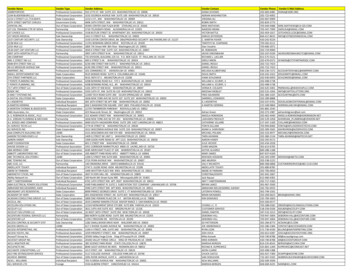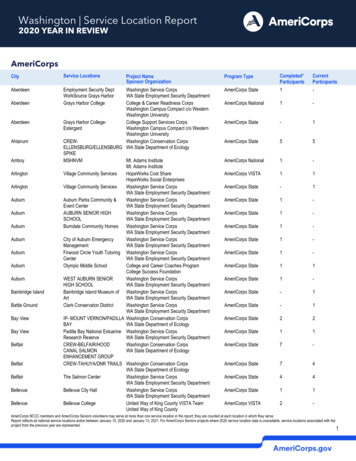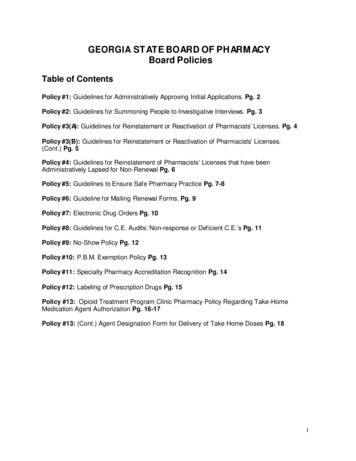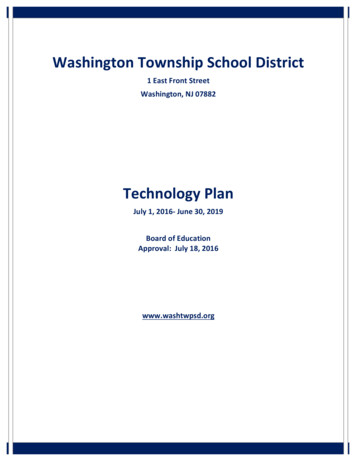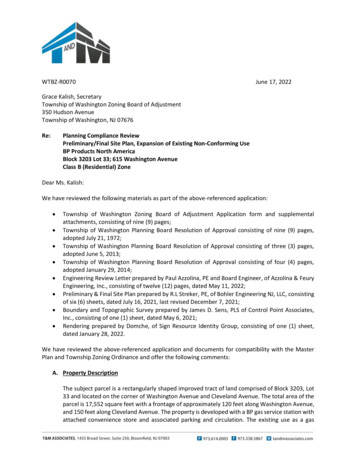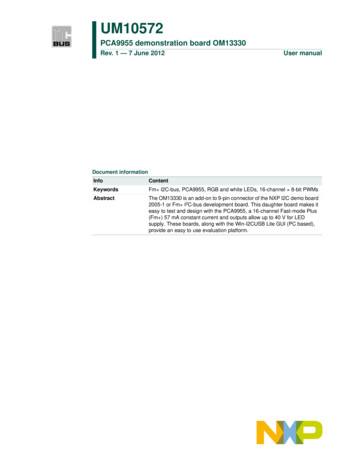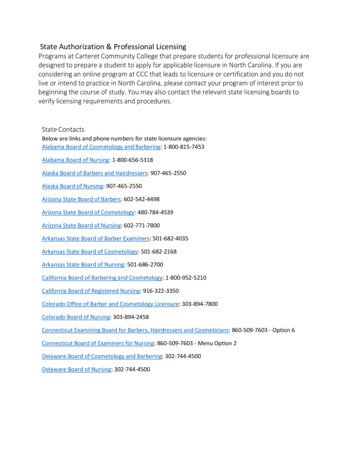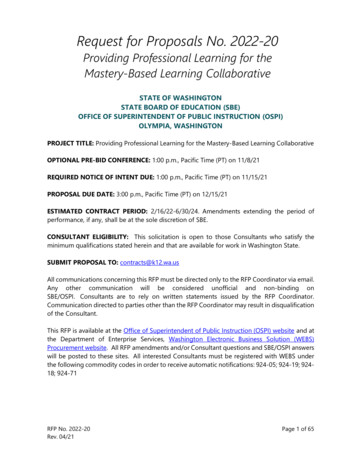
Transcription
Request for Proposals No. 2022-20Providing Professional Learning for theMastery-Based Learning CollaborativeSTATE OF WASHINGTONSTATE BOARD OF EDUCATION (SBE)OFFICE OF SUPERINTENDENT OF PUBLIC INSTRUCTION (OSPI)OLYMPIA, WASHINGTONPROJECT TITLE: Providing Professional Learning for the Mastery-Based Learning CollaborativeOPTIONAL PRE-BID CONFERENCE: 1:00 p.m., Pacific Time (PT) on 11/8/21REQUIRED NOTICE OF INTENT DUE: 1:00 p.m., Pacific Time (PT) on 11/15/21PROPOSAL DUE DATE: 3:00 p.m., Pacific Time (PT) on 12/15/21ESTIMATED CONTRACT PERIOD: 2/16/22-6/30/24. Amendments extending the period ofperformance, if any, shall be at the sole discretion of SBE.CONSULTANT ELIGIBILITY: This solicitation is open to those Consultants who satisfy theminimum qualifications stated herein and that are available for work in Washington State.SUBMIT PROPOSAL TO: contracts@k12.wa.usAll communications concerning this RFP must be directed only to the RFP Coordinator via email.Any other communication will be considered unofficial and non-binding onSBE/OSPI. Consultants are to rely on written statements issued by the RFP Coordinator.Communication directed to parties other than the RFP Coordinator may result in disqualificationof the Consultant.This RFP is available at the Office of Superintendent of Public Instruction (OSPI) website and atthe Department of Enterprise Services, Washington Electronic Business Solution (WEBS)Procurement website. All RFP amendments and/or Consultant questions and SBE/OSPI answerswill be posted to these sites. All interested Consultants must be registered with WEBS underthe following commodity codes in order to receive automatic notifications: 924-05; 924-19; 92418; 924-71RFP No. 2022-20Rev. 04/21Page 1 of 65
OSPI, and its contractors and subcontractors, must not discriminate in any programs or services based onsex, race, creed, religion, color, national origin, age, marital status, honorably discharged veteran or militarystatus, sexual orientation, gender expression, gender identity, disability, or the use of a trained dog guide orservice animal by a person with a disability, and must comply with state and federal nondiscrimination laws,including Section 504 of the Rehabilitation Act of 1973, Title IX of the Education Amendments of 1972, theAmericans with Disabilities Act, and Title VI of the Civil Rights Act of 1964. Questions and complaints ofalleged discrimination should be directed to the Equity and Civil Rights Director at 360-725-6162/TTY: 360664-3631; or P.O. Box 47200, Olympia, WA 98504-7200; or equity@k12.wa.us.RFP No. 2022-20Rev. 04/21Page 2 of 65
Table of ContentsSection A.INTRODUCTION . 5A.1.DEFINITIONS . 5A.2.PURPOSE OF REQUEST FOR PROPOSALS . 7A.3.BACKGROUND . 8A.4.OBJECTIVE AND SCOPE OF WORK . 10A.5.BIDDER QUALIFICATIONS . 15A.6.PERIOD OF PERFORMANCE . 16A.7.FUNDING . 17A.8.INDIRECT COSTS . 17A.9.AMERICANS WITH DISABILITIES ACT . 18Section B.GENERAL INFORMATION FOR BIDDERS . 19B.1.RFP COORDINATOR . 19B.2.QUESTIONS & ANSWERS . 19B.3.ESTIMATED SCHEDULE OF PROCUREMENT ACTIVITIES . 19B.4.NOTICE OF INTENT . 20B.5.PRE-BID CONFERENCE . 20B.6.COMPLAINT PROCEDURE. 21B.7.SUBMISSION OF PROPOSALS . 21B.8.PROPRIETARY INFORMATION/PUBLIC DISCLOSURE . 22B.9.ADDENDUMS AND AMENDMENTS TO THE RFP . 22B.10.SMALL BUSINESS, MINORITY & WOMEN’S BUSINESS ENTERPRISES (MWBE),AND VETERAN-OWNED BUSINESS PARTICIPATION . 23B.11.ETHICS, POLICIES, & LAW. 23B.12.ACCEPTANCE PERIOD . 23B.13.RESPONSIVENESS . 24B.14.MOST FAVORABLE TERMS . 24B.15.CONTRACT AND GENERAL TERMS & CONDITIONS . 24B.16.COSTS TO PROPOSE . 25RFP No. 2022-20Rev. 04/21Page 3 of 65
B.17.NO OBLIGATION TO CONTRACT . 25B.18.REJECTION OF PROPOSALS . 25B.19.COMMITMENT OF FUNDS . 25B.20.STATEWIDE VENDOR PAYMENT REGISTRATION . 25B.21.INSURANCE COVERAGE . 26Section C.PROPOSAL CONTENTS . 27C.1.PROPOSAL OVERVIEW . 27C.2.LETTER OF SUBMITTAL . 27C.3.TECHNICAL PROPOSAL . 28C.4.MANAGEMENT PROPOSAL . 29C.5.COST PROPOSAL . 30Section D.EVALUATION AND AWARD . 32D.1.EVALUATION PROCEDURE. 32D.2.EVALUATION WEIGHTING AND SCORING . 32D.3.ORAL PRESENTATIONS. 32D.4.SELECTION OF APPARENT SUCCESSFUL BIDDER . 33D.5.NOTIFICATION TO BIDDERS . 33D.6.DEBRIEFING OF UNSUCCESSFUL BIDDERS . 33D.7.PROTEST PROCEDURE . 34Section E.RFP EXHIBITS . 36EXHIBIT A . 37EXHIBIT B . 39EXHIBIT C. 41EXHIBIT D . 45EXHIBIT E . 59EXHIBIT F. Error! Bookmark not defined.EXHIBIT G. Error! Bookmark not defined.EXHIBIT H . 63RFP No. 2022-20Rev. 04/21Page 4 of 65
Section A.A.1.INTRODUCTIONDEFINITIONSDefinitions for the purposes of this RFP include:Agency or OSPI – The Washington State Office of Superintendent of Public Instruction; theentity issuing this RFP on behalf of the State Board of Education.Amendment – A unilateral change to the Solicitation that is issued by OSPI, on behalf of SBE,at its sole discretion and posted on WEBS and OSPI’s website.Apparent Successful Bidder (ASB) – A Bidder submitting a response to this Solicitation that isevaluated and is identified and announced by OSPI, on behalf of SBE, as providing the best valueto the Agency. Upon execution of a Contract, the ASB is referred to as the successful Bidder orthe Contractor.Bid – An offer, proposal, or quote for goods or services submitted in response to this RFP.Bidder – Individual organization, public or private agency submitting a proposal in order toattain a contract with SBE. For purposes of this Solicitation, the terms Bidder, Consultant, andVendor are interchangeable.Competitive Solicitation – A documented formal process providing an equal and openopportunity to Bidders or Consultants culminating in a selection based on predeterminedcriteria.Complaint – A process that may be followed by a Consultant prior to the deadline for bidsubmission to alert SBE/OSPI of certain types of asserted deficiencies in the Solicitation.Consultant – Individual organization, public or private agency submitting a proposal in orderto attain a contract with SBE. For purposes of this Solicitation, the terms Bidder, Consultant, andVendor are interchangeable.Contractor – Individual or company whose proposal has been accepted by SBE and is awardeda fully executed, written contract.Culturally Responsive-Sustaining Education (CRSE) – Culturally responsive-sustainingeducation is grounded in a cultural view of learning and human development in which multipleexpressions of diversity (e.g., race, social class, gender, language, sexual orientation, nationality,religion, ability) are recognized and regarded as assets for teaching and learning. CRSE exploresRFP No. 2022-20Rev. 04/21Page 5 of 65
the relationship between historical and contemporary conditions of inequality and ideas thatshape access, participation, and outcomes for learners.1Debriefing – A short meeting an unsuccessful Bidder may request with the Coordinatorfollowing the announcement of the Apparent Successful Bidder for the purpose of receivinginformation regarding the review and evaluation of that Bidder’s Response.Educator – A broad term that includes, but is not limited to, teachers, principals, counselors,paraeducators, educational support associates, and educator preparation program instructors(e.g. faculty, lecturers, etc.).Mastery-based Learning (MBL) – The state defined mastery-based learning in 2019 House Bill1599: Students advance upon demonstrated mastery of content; Competencies include explicit, measurable, transferable learning objectives thatempower students; Assessments are meaningful and a positive learning experience for students; Students receive rapid, differentiated support based on their individual learning needs;and Learning outcomes emphasize competencies that include application and creation ofknowledge along with the development of important skills and dispositions.Mastery-based learning is also referred to as competency-based education.Mastery-based Learning Collaborative (MBLC) – A group that includes educators,contractors, and staff from grantee schools and other organizations, such as state agencies andcommunity-based organizations.Project Evaluator – One or more individuals hired or contracted with by SBE to evaluate theproject.Proposal – A formal offer submitted in response to this RFP.Proprietary Information – Information such as patents, technological information or otherrelated information that the Bidder or Consultant does not want released or shared with thepublic.Protest – A process that may be followed by a Bidder after the announcement of the ApparentSuccessful Bidder to alert SBE/OSPI to certain types of alleged errors in the evaluation of theSolicitation.1New York State Education Department Framework for Culturally Responsive-Sustaining Education.RFP No. 2022-20Rev. 04/21Page 6 of 65
Request for Proposals (RFP) – Formal procurement document in which a service or need isidentified but no specific method to achieve it has been chosen. The purpose of an RFP is topermit the consultant community to suggest various approaches to meet the need at a givenprice.RCW – The Revised Code of Washington.Responsible Bidder – An individual, organization, public or private agency, or other entity thathas demonstrated the capability to meet all the requirements of the Solicitation and meets theelements of responsibility. (See RCW 39.26.160 (2))Responsive Bidder – An individual, organization, public or private agency, or other entity whohas submitted a Bid that fully conforms in all material respects to the Solicitation and all itsrequirements, in both form and substance.RFP Coordinator – An individual or designee who is employed by OSPI and who is responsiblefor conducting this Solicitation on behalf of SBE.Solicitation – A formal process providing an equal and open opportunity for Biddersculminating in a selection based upon predetermined criteria.State Board of Education (SBE) – The State Board of Education, the entity seeking to contractwith a Consultant to provide the service(s) described in this RFP.Subcontractor – An individual or other entity contracted by a Consultant to perform part of theservices or to provide goods under the Contract resulting from this Solicitation. Subcontractors,if allowed, are subject to the advance approval of SBE.Vendor – Individual organization, public or private agency submitting a proposal in order toattain a contract with SBE. For purposes of this Solicitation, the terms Bidder, Consultant, andVendor are interchangeable.WEBS – Washington’s Electronic Business Solution, the Consultant notification system found atWashington Electronic Business Solution (WEBS) Procurement website and maintained by theWashington State Department of Enterprise Services.A.2.PURPOSE OF REQUEST FOR PROPOSALSThe State Board of Education (SBE) is initiating this Request for Proposals (RFP) to solicitproposals from Consultants interested in providing professional learning for educators in theWashington State Mastery-based Learning Collaborative (MBLC) as part of a demonstrationproject taking place in select school districts throughout Washington State. Ultimately,evaluation of the professional learning will inform the identification and development ofRFP No. 2022-20Rev. 04/21Page 7 of 65
effective policies, practices, and system changes that can contribute to the application ofmastery-based learning (MBL) programs throughout the Washington K-12 education system.A.3.BACKGROUNDThe State Board of Education (SBE) is the agency with the goal of providing advocacy andstrategic oversight of public education; implementing a standards-based accountability systemto improve student academic achievement; providing leadership in the creation of a system thatpersonalizes education for each student and respects diverse cultures, abilities, and learningstyles; and promoting achievement of the Basic Education Act goals of RCW 28A.150.210.Under the leadership of SBE, and with executive sponsorship from SBE, the Office ofSuperintendent of Public Instruction (OSPI) and the Professional Educator Standards Board(PESB), the MBLC will involve a statewide effort, including personnel at state agencies,educational service districts, community-based partners, educator preparation programs, andparticipating districts and schools. OSPI is issuing, and will serve as the point of contact, for thisRFP on behalf of SBE.Washington’s 2023 biennial budget for SBE includes 5 million2 to implement mastery-basedlearning in school district demonstration sites for the purpose of addressing learning recoveryand other educational issues related to the COVID-19 pandemic. This work will involvedeveloping state and regional support structures for MBL.To this end, SBE will administer a project of MBL demonstration sites, to identify best practicesfor implementing MBL, identify sample tools for using a MBL approach, and offer professionallearning to in-service educators, including teachers, principals, and counselors. The project’soverall goal is to inform future policy by helping decision-makers3 better understand whatquality MBL looks like, how long it takes to implement, and what resources are necessary.Overall MBLC objectives include:a. Establish a statewide infrastructure to provide professional development, policy, andcommunications support to enable schools to implement MBL.b. Demonstrate that schools can successfully implement MBL with student learning andassessment that are more authentic, engaging, and culturally connected and sustaining.The 5 million is split into 1.5 million for fiscal year 2022 and 3.5 million for fiscal year 2023. Inaddition, we anticipate 2.5 million of federal money being available via OSPI for fiscal year 2024. Thesefunds will pay for school grants, professional learning, project evaluation, and administration. We intendto supplement state funding with private grant funding, including funding to support and possibly scale upproject implementation during subsequent years.3The emphasis is primarily on state decision-makers, but we welcome insights related to local decisionmaking too.2RFP No. 2022-20Rev. 04/21Page 8 of 65
c. Document the key steps that states, districts, and schools must take to transition to MBLsuccessfully.d. Positively impact student engagement and progress toward learning goals.So far, MBL has been adopted primarily by individual schools, with some larger scaleimplementation in select districts and a few smaller states. MBL has several important attributes: MBL is personalized learning where students advance upon mastery of content asmeasured by meaningful, authentic assessments tied to state learning standards. Students take ownership of their learning and receive differentiated support based ontheir interests and needs. MBL honors students’ assets and cultural backgrounds, and has been shown to helpclose opportunity and achievement gaps.Beginning in December 2021, SBE expects to award grants4 to up to 30 schools and schooldistricts of varying sizes to support their transition to MBL. In addition, OSPI will contract onbehalf of SBE to provide professional learning as outlined in this RFP. We will contract separatelyfor independent evaluation of the project, including formative evaluation to help guidedevelopment and implementation of professional learning.We envision fiscal year 2022 as a planning period and fiscal years 2023 and 2024 as professionallearning years. Educators will begin implementing their professional learning during fiscal year2023 while they learn, and fully implement MBL in their classrooms by the end of fiscal year2024. Our goal is full building implementation by the end of fiscal year 2024. Schools already atfull building implementation when they began participation will have enhanced theirimplementation and shared knowledge and resources with other schools.The Contractor will work with grantees and the project evaluator in the early stages of this workto ensure the planning period is useful in helping schools evaluate their current structure andprocesses and plan for the future, to set them up for success with MBL professional learning infiscal year 2023. The contractor will also work with grantees and the project evaluatorthroughout subsequent years to plan and implement professional learning and to ensurecoordination of state and local professional learning plans, activities, and data collection. Thisincludes Contractor’s use of the project evaluator’s formative evaluation to inform professionallearning provided by the Contractor. Schools are expected to coordinate their professionallearning activities with the Contractor and assist with data collection.We will have two membership levels for schools in the MBL Collaborative: MBLC Incubator: for schools that are new to MBL (or are doing it in one department orgrade, etc. but want to expand to the full building)Totaling 800,000 in fiscal year 2022 (i.e. 7/1/21-6/30/22) and 2,500,000 per year in fiscal years 2023and 2024.4RFP No. 2022-20Rev. 04/21Page 9 of 65
MBLC Living Lab: for a small number of schools who are already implementing MBL, whoour Incubator schools can learn from and who will contribute to the community bysharing resources, etc.Schools will self-identify which level they intend to join at in their application. Schools can viewthe School Invitation Information Packet to apply for the Mastery-based Learning Collaborative(MBLC) grant on our website for additional information.In addition, professional learning opportunities will be available to “Friends of the MBLCInterest Group” who may participate on a limited basis, including receiving a newsletter andopting in for professional learning opportunities such as visits to schools, online sessions, andparticipation in summer institutes, if space is available.A.4.OBJECTIVE AND SCOPE OF WORKA. Objective:The objective of this Request for Proposals (RFP) is to solicit proposals from Consultants forproviding professional learning opportunities and materials to help educators in up to thirty (30)schools across Washington State implement mastery-based learning (MBL) in their schools. Thiswork will promote development and implementation of MBL systems, structures, andprocedures that can be shared and used to inform policy development. These professionallearning opportunities and materials will:1. Be customizable to respond to local school and community needs2. Follow the Revised Code of Washington (RCW) guidance on effective professionallearning, linked below and written out in Exhibit H:a. RCW 28A.415.430. Professional learning—Defined—Scope.b. RCW 28A.415.432. Professional learning—Standards.c. RCW 28A.415.434. Professional learning—Definitions3. Align with The Professional Educator Standards Board’s (PESB’s) Cultural Competency,Diversity, Equity, and Inclusion (CCDEI) standards, within ninety (90) days of theiradoption by PESB.54. Align with educator evaluation frameworks, such as the Teacher and Principal EvaluationProgram (TPEP)5. Incorporate universal design for learning principles, including within online learningenvironments; and in doing so, enable educators to design and deliver inclusiveinstruction that includes leveraging the strengths of and supporting:The Professional Educator Standards Board (PESB) is currently developing Cultural Competency,Diversity, Equity, and Inclusion (CCDEI) standards, under Senate Bill 5044. Adoption is anticipated inspring 2022, and public input opportunities will be available this fall. These standards will be used forprofessional learning in Washington state. Since much of SBE’s Mastery-based Learning initiativeinvolves professional learning, it will be important for the Contractor to take these standards intoaccount as they are rolled out. For updates, please see PESB’s CCDEI webpage.5RFP No. 2022-20Rev. 04/21Page 10 of 65
6.7.8.9.10.11.12.a. Culturally and linguistically diverse students.b. English learners.c. Students with disabilities.d. Foster youth.e. Students experiencing homelessness.Build the capacity of schools and districts as they respond to the evolving educationalenvironment in response to COVID-19, implementing mastery-based learning, andsocial justice/equity issues.Address the needs of administrators, other leaders, and counselors with regard tosupporting MBL.a. This includes instructional leadership development to promote teacher andleader effectiveness. The provider must offer tools and processes to developand enhance instructional leadership and the professional school culture on anon-going basis, such as: communicating meaningful and actionable feedback toteachers and staff regarding classroom MBL implementation; offering trainingin best practices for classroom walkthroughs and teacher and leader coachingin MBL; and offering support for administering MBL and CRSE professionaldevelopment aligned to staff evaluation data.b. To accomplish this work, the contractor will need to be adept at promoting aprofessional learning culture in diverse school settings and adapting to thenuances of district-specific evaluation rubrics and protocols.Incorporate paraeducators as an asset in the MBL context.Provide implementation support for participating educators that includes, at aminimum, the following elements:a. Opportunities for educators to apply their professional learning takeaways andreceive timely feedback.b. Timely supports provided to schools for implementation of student learningprograms.c. Opportunities for teachers to engage in professional learning communitiesincluding CRSE practices.d. Strategies for responding to of a variety of student needs, including those ofEnglish learners and students with disabilities.Incorporate best practices for MBL implementation as agreed upon in theMBL/Competency-based Education (CBE) field (i.e. as identified by Aurora Institute andother experts in the field). Examples include: culturally responsive-sustaining educationpractices, performance-based assessments, equitable grading practices, etc.Be accessible to people with disabilities, including accurate captioning and meeting orexceeding Web Content Accessibility Guidelines (WCAG) 2.0 Conformance Level AA.Reflect input from SBE, OSPI, PESB, and other MBLC members as appropriate.RFP No. 2022-20Rev. 04/21Page 11 of 65
B. Scope of Work:The contractor will have primary responsibility for designing and implementing a MBLCprofessional learning program. This may include: facilitating multiple Professional LearningCommunities (PLCs) designed to build capacity with implementing Culturally-ResponsiveSustaining Education (CRSE), mastery, and youth-centered practices; as well as a range ofprofessional learning and knowledge-sharing opportunities including virtual or in-person sitevisits; community gatherings; youth summits; opt-in online sessions; summer institutes; regionaland statewide learning events, and developing a digital MBL Tool Kit of shared resources. Thecontractor will take the lead role in facilitating statewide professional learning meetings.1. Work PlanThe proposal must include a draft MBLC professional learning work plan, which will form thebasis for an approved work plan to be co-developed6 with MBLC personnel by 6/23/22 andrevised annually after that. At a minimum, include the following elements:1. A narrative description of professional learning objectives.2. A narrative description of MBL and related CRSE professional learning activities theContractor will provide for educators, including:a. Professional learning model (e.g. train-the-trainer, professional learningcommunity, job-embedded, other model, or combination of models); timing(e.g. during regular school work day, evenings, weekends, summer); anddelivery mode (e.g. in-person, online, hybrid, synchronous, asynchronous).b. A description of any online platform(s) you would use and how you will makeonline learning engaging for participants.3. A narrative description of MBL and CRSE professional learning resources thecontractor will provide for educators, including:a. An MBL Tool Kit, updated annually, including virtual training modules andother resources related to MBL prof
RFP No. 2022-20 Page 6 of 65 Rev. 04/21 the relationship between historical and contemporary conditions of inequality and ideas that shape access, participation, and outcomes for learners.1 Debriefing - A short meeting an unsuccessful Bidder may request with the Coordinator following the announcement of the Apparent Successful Bidder for the purpose of receiving

